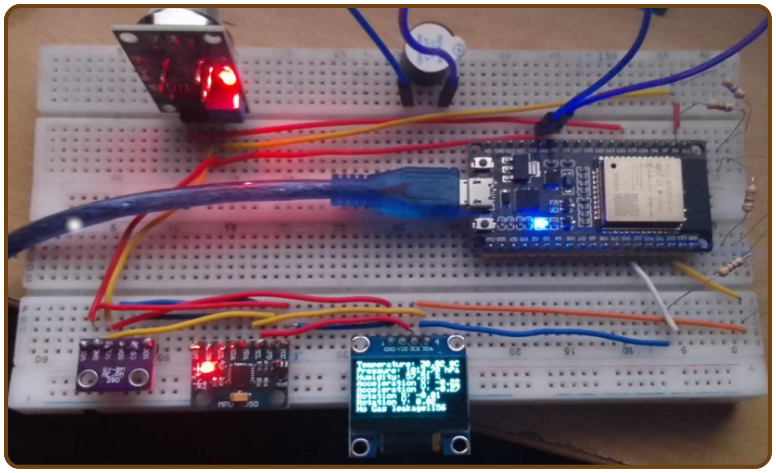Hazard Detection and Monitoring System
A ESP32 board based system to detect fire, gas leakage and earthquake and send alerts to the user via Telegram integration.

Project Overview
The Hazard Detection and Monitoring System—developed by team The Mans—combines multiple sensing modalities with an ESP32 controller to identify fire, gas leakage, and earthquake hazards and notify users instantly.
Objective
- Design and implement a unified platform that detects critical hazards (fire, gas leakage, earthquake)
- Deliver local and remote alerts through audible, visual, and digital channels
System Overview
- Central Microcontroller: ESP32 with 32-bit processing, built-in Wi-Fi, and extensive GPIO support
- Sensor Suite: MQ-2 gas sensor, BME280 environmental sensor, MPU-6050 inertial measurement unit
- Outputs: Buzzer alarm, 0.96" OLED display, Telegram bot notifications
How It Works
- MQ-2, BME280, and MPU-6050 collect gas concentration, temperature, humidity, pressure, and motion data
- Live readings are rendered on the OLED display for on-site awareness
- Threshold-based logic flags abnormal conditions as hazards
- Once triggered, the buzzer sounds and the Telegram bot pushes an alert with sensor data to the designated chat
- Pressure and humidity readings provide contextual insight even when no hazard is detected
Core Components
ESP32 Microcontroller
- Low-cost, Wi-Fi enabled MCU powering sensing, decision logic, and communication
- 38 GPIO pins support simultaneous sensor and output integration
MQ-2 Gas Sensor
- Detects smoke and flammable gases to identify leakage scenarios
- Provides early warning before concentrations reach dangerous levels
BME280 Environmental Sensor
- Monitors temperature, pressure, and humidity
- Elevated temperature readings help classify potential fire events
- Additional data improves situational understanding for users
MPU-6050 IMU
- 3-axis accelerometer and gyroscope capture motion and orientation
- Sudden or unusual movements indicate possible earthquakes or structural instability
Outputs and Notification Channels
- OLED Display: 128×64 resolution panel that streams live sensor metrics
- Buzzer Alarm: Immediate audible warning when any hazard threshold is exceeded
- Telegram Bot: Hazard Alarm Bot dispatches event summaries and telemetry to selected users or groups
Challenges and Limitations
- Current prototype treats threshold violations as hazards, which can produce false positives
- Operating envelope does not cover extreme temperatures above 70 °C and the device itself is not fire-proof